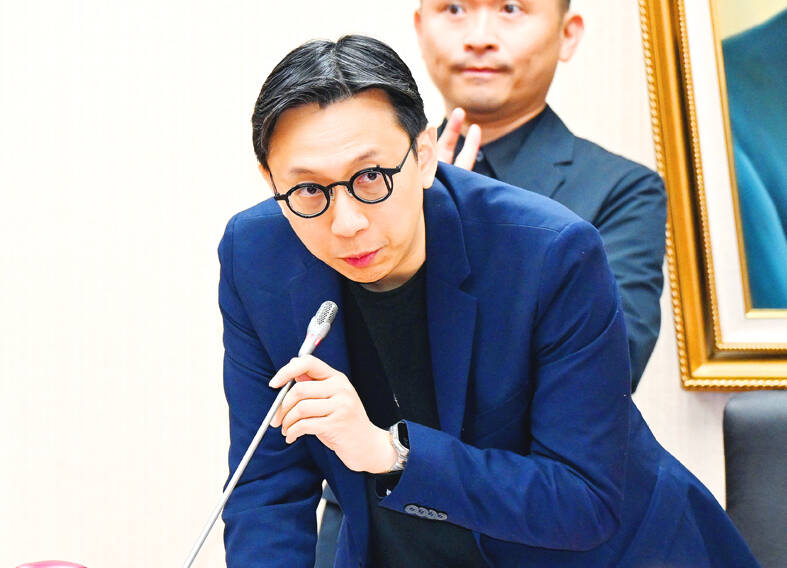Experts yesterday urged lawmakers to facilitate the development of a generative artificial intelligence (AI) system that utilizes Taiwan-centric Chinese language content amid a push to pass tech-friendly copyright laws.
Academics and industry insiders made the comment at a joint hearing on proposals to craft an AI basic law held by the Legislative Yuan’s Education and Culture Committee and Transportation Committee.
The committees were considering clashing initiatives to pass an AI basic law spearheaded by the Ministry of Digital Affairs and Chinese Nationalist Party (KMT) lawmakers Chiu Jo-Hua (邱若華) and Ko Ju-chun (葛如鈞).

Photo: Liao Cheng-hui, Taipei Times
Government leadership is required in the industry-wide effort to develop large-language models that focus on content written in traditional Chinese characters, Institute for Information Industry researcher Hung Yu-shiang (洪毓祥) said.
Officials could provide valuable assistance in promoting public-private collaborations to create a workforce for the AI sector, and craft a legal framework to regulate the industry’s use of data and privacy standards, he said.
EU member states could serve as a model for Taiwan’s emulation, he said.
Caroline Lin (林志潔), a professor of technology law at National Yang Ming Chiao Tung University, said the bills being presented failed to address concerns over Taiwan’s AI sovereignty.
The algorithms currently available too often produce content nominally written in traditional Chinese characters, but make use of syntax and phrases derived from Chinese-style Mandarin, not that of Taiwan’s, she said.
Lawmakers and officials must understand policies concerning the AI industry have national security and geopolitical ramifications, and are not a simple matter of boosting the economy, Lin said.
MeetTomorrow Inc cofounder Hsueh Liang-bin (薛良斌), whose company developed the generative AI MeetAndy, supported Ko’s proposal to create a national AI strategy committee except parts that authorized mayors and county commissioners to participate in the organization.
A national-level mechanism to assess and handle the risks posed by AI systems similar to the ones established by the EU AI Act is needed to protect Taiwan’s economic and national interest, he said.
Deputy Minister of Digital Affairs Yeh Ning (葉寧) said the ministry is not prepared to unveil its proposal at the moment, as the Executive Yuan is still in the process of assessing its requisite funding levels.
Overcoming capability gaps in Taiwan’s AI industry with regard to large language models and creating a legal framework governing fair use of data by developers are the ministry’s main concerns regarding the bill, he said.
Officials are creating a database for traditional Chinese character-based content and a national-level corpus, but it is expected to be time-consuming, he said.
The Ministry of Digital Affairs is additionally cultivating a workforce in collaboration with the National Council of Science and Technology and the Ministry of Education, he said.
The government’s AI development policy is to be guided by digital equality, with an emphasis on infrastructure and applied AI that spread the benefits of technology among all Taiwanese, he said.
Ko acknowledged concerns of the hearing’s participants over AI sovereignty, saying that governmental agencies should play a larger role in creating the databases that would be used to train Taiwanese AIs,
Premier Cho Jung-tai (卓榮泰) is urged to be more active in the legislative and executive branches’ discussions about the proposed AI basic law, he added.

Taiwan is stepping up plans to create self-sufficient supply chains for combat drones and increase foreign orders from the US to counter China’s numerical superiority, a defense official said on Saturday. Commenting on condition of anonymity, the official said the nation’s armed forces are in agreement with US Admiral Samuel Paparo’s assessment that Taiwan’s military must be prepared to turn the nation’s waters into a “hellscape” for the Chinese People’s Liberation Army (PLA). Paparo, the commander of the US Indo-Pacific Command, reiterated the concept during a Congressional hearing in Washington on Wednesday. He first coined the term in a security conference last

Prosecutors today declined to say who was questioned regarding alleged forgery on petitions to recall Democratic Progressive Party (DPP) legislators, after Chinese-language media earlier reported that members of the Chinese Nationalist Party (KMT) Youth League were brought in for questioning. The Ministry of Justice Investigation Bureau confirmed that two people had been questioned, but did not disclose any further information about the ongoing investigation. KMT Youth League members Lee Hsiao-liang (李孝亮) and Liu Szu-yin (劉思吟) — who are leading the effort to recall DPP caucus chief executive Rosalia Wu (吳思瑤) and Legislator Wu Pei-yi (吳沛憶) — both posted on Facebook saying: “I

The Ministry of Economic Affairs has fined Taobao NT$1.2 million (US$36,912) for advertisements that exceed its approved business scope, requiring the Chinese e-commerce platform to make corrections in the first half of this year or its license may be revoked. Lawmakers have called for stricter enforcement of Chinese e-commerce platforms and measures to prevent China from laundering its goods through Taiwan in response to US President Donald Trump’s heavy tariffs on China. The Legislative Yuan’s Finance Committee met today to discuss policies to prevent China from dumping goods in Taiwan, inviting government agencies to report. Democratic Progressive Party Legislator Kuo Kuo-wen (郭國文) said

Sung Chien-liang (宋建樑), who led efforts to recall Democratic Progressive Party (DPP) Legislator Lee Kun-cheng (李坤城), was released on bail of NT$80,000 today amid outcry over his decision to wear a Nazi armband to questioning the night before. Sung arrived at the New Taipei District Prosecutors’ Office for questioning in a recall petition forgery case last night wearing a red armband bearing a swastika, carrying a copy of Adolf Hitler’s Mein Kampf and giving a Nazi salute. Sung left the building at 1:15am without the armband and covering the book with his coat. Lee said today that this is a serious